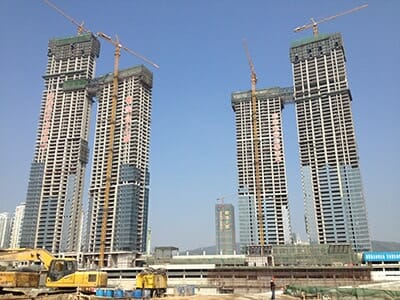
Shenzhen has seen housing prices climb by more than 50 percent in the last year
A 24 percent drop in weekly home sales in Shenzhen, paralleled by talk of new home sales restrictions in Shanghai could signal serious steps by China’s government to clamp down on raging first-tier housing markets. Meanwhile, slumping mall sales have Sun Hung Kai looking to pop-up shops in Hong Kong, and much more if you’ll just read on.
Shenzhen Home Sales Fell by 24% Last Week
The skyrocketing Shenzhen housing market cooled off in March as transaction volumes saw a marked slowdown, signalling an abrupt turn in market sentiment.
Total transactions by area in the nation’s most expensive city decreased 24 per cent to 89,400 square metres last week over the prior week, and fell 10 per cent year on year, according to China Index Academy. That compares to at least 25 per cent year on year growth in three other first-tier cities of Beijing, Shanghai and Guangzhou. Read more>>
China Resources Land Expects New Home Price Restrictions in First Tier Cities
State-backed property developer China Resources Land Ltd on Monday said local governments in the country’s top-tier cities may introduce partial short-term tightening measures to tame an overheating housing market.
China’s home prices rose at their fastest clip in almost two years in February given red-hot demand in big cities, but risks of overheating in some places combined with weak growth in smaller cities threaten to put more stress on an already slowing economy. Read more>>
Sun Hung Kai Introduces Pop-Up Shops in Hong Kong Mall
Sun Hung Kai Properties (0016) will offer six shops for short-term lease at apm mall in Kwun Tong to boost revenue amid tough times for retailers.
Each of the “pop-up stores” will be between 100-300 square feet and carry up to a six-month lease. Those who lease the shops must pay a monthly rent plus a percentage of sales. Read more>>
China Could Tax Cross-Border Deals to Curb Capital Outflows
China is looking at introducing a tax on foreign currency transactions, among other measures, to curb speculative capital flows, even though outflows have recently slowed, a senior foreign-exchange regulatory official said Tuesday.
Wang Yungui, the head of the regulation department at China’s State Administration of Foreign Exchange, said in a briefing that the regulator is studying a Tobin tax. This kind of levy aims to penalize short-term currency speculation and is named for Nobel Prize-winning economist James Tobin. Read more>>
Colliers to Market CSCEC’s Failed $3.5B Bahamas Resort
Baha Mar’s receivers have launched a formal sales process for the stalled $3.5 billion project by hiring a Canadian-headquartered real estate firm to market it to potential purchasers.
Raymond Winder, Deloitte & Touche (Bahamas) managing partner, told Tribune Business that the move to engage Colliers International was “a very important step” towards resolving the problems plaguing the Cable Beach-based development.
And he expressed hope that the move would give Bahamians “the sense there’s light at the end of the tunnel” over Baha Mar, and the negative impact its failure has had on job creation, economic growth and business/investor confidence. Read more>>
Shanghai Govt Promotes Qiantan as City’s Next CBD
QIANTAN, a 2.8-square-kilometer new business district along the bank of Huangpu River in Pudong New Area , is embracing both opportunities and challenges as it bears the potential to become the next CBD of Shanghai, global real estate consultancy Colliers International has concluded in a latest research.
Under an earlier released government masterplan, the district, located south of the former World Expo site, is expected to be built into a new core international business community by 2020 with some 3.5 million square meters of commercial and residential real estate being completed. Read more>>
CapitaLand Takes Long Term View on China Market
CapitaLand, Singapore’s largest developer, has shrugged off the gloomy sentiment pervading China’s real estate sector amid an economic slowdown, announcing that it would continue to boost its land bank in the world’s second-largest economy.
Lim Ming Yan, chief executive of CapitaLand, which has almost half of its assets under management in China, said the developer would also strengthen efforts to “go digital” as it believed that fast-growing internet technologies would usher in tremendous opportunities in the world’s most populated market. Read more>>
Tune in again tomorrow for more news, and be sure to follow @Mingtiandi on Twitter for headlines as they happen.
Leave a Reply